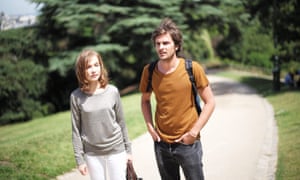It’s a summer of revolution for Nathalie. The high school philosophy teacher has just found out her husband of 25 years is leaving her. In a few weeks her mother will be dead. Then she’ll know freedom for the first time. Suddenly, in her 60s, she’ll be alone and unmoored, with no more excuses for not putting the theories she’s been teaching for years into practice. The way is wide open, but the journey seems terrifying.

Doubt and uncertainty plague Isabelle Huppert’s philosophy teacher after her husband announces he’s leaving her in a smart, earnest drama
Mia Hansen-Løve has flicked from Eden – her drama about youthful uncertainty in the creative arts - to a pension-age version of the same. Nathalie, played byIsabelle Huppert, is no more certain of herself or her future than Paul, the restless, twenty-something house DJ at the centre of Hansen-Løve’s last film. The philosopher has intellectualised herself into a corner. Her cosy affluent existence - two grown-up kids, book-lined pad - has become less about living her philosophy than the escape into the study of it.
Hansen-Løve channels Huppert’s superior air to great effect. Nathalie is operating in a world where nearly everyone is younger and more idealistic than she is. They’re also less set in their lives, more open to change and experimentation. “I’m think I’m too old to be an anarchist,” she tells one young friend. “I tried it years ago.”
She visits her publisher, where “the marketing fiends” want to give her long-running textbook a makeover, bringing out the new edition with a bright cover and zippy graphic design. “We need to make them more attractive, less austere,” her publisher says. Nathalie balks as if it were the ideas, not the dust jackets, that were being prettified. “They look like an ad for M&Ms,” she snarls.
Circling her and testing her weak spots is a protégé (Roman Kalinka) that Nathalie has come to idolise, perhaps because he is having a go at seeing through what Nathalie gave up. He’s got a burgeoning interest in anarchy, attends all-night protests and – when those become too vanilla for him – decides to decamp to the countryside to a group-owned commune. There he listens to Woody Guthrie, makes cheese and works on his writing his papers. Nathalie comes for a visit, scanning his shelves and pulling out copies of Anarchy 2.0 and The Unabomber’s Manifesto. “People tend to confuse radicalism with terrorism,” her former student says in defence. It’s unclear how seriously we’re supposed to take him. How much Hansen-Løve is inviting our ridicule or our admiration. Perhaps a full commitment to living by any philosophy leaves you open to both?
The film is occasionally meandering and a bit too loose. A subplot about the fate of Nathalie’s mum’s black cat, Pandora, is drained of every drop of symbolism well before Hansen-Løve stops wringing it. But mostly, Things to Come is a smart, earnest undertaking: an exploration of the insecurity that can hit any of us, at any age, when we start to question the life we’ve built.
“I’m coping very well,” Nathalie tells a student, forgetting the assessment is not up to her. The more frank declaration comes from a priest, speaking about her – based on Nathalie’s instructions – at her mother’s funeral: “Doubt and questioning are built into faith. You have made them your life.”
Nenhum comentário:
Postar um comentário